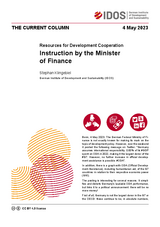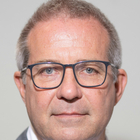Resources for Development Cooperation
Instruction by the Minister of Finance
Klingebiel, StephanThe Current Column (2023)
Bonn: German Institute of Development and Sustainability (IDOS), The Current Column of 4 May 2023
Bonn, 4 May 2023. The German Federal Ministry of Finance is not exactly known for making its mark on the topic of development policy. However, over the weekend it posted the following message on Twitter: "Germany assumes international responsibility. 0.83% of its #GDP spent on ODA in 2022, making it the largest donor of the #G7. However, no further increase in official development assistance is possible. #ODA".
In addition, there is a graph with ODA (Official Development Assistance), including humanitarian aid, of the G7 countries in relation to their respective economic power (GNI).
The posting is interesting for several reasons. It simplifies and distorts Germany's laudable ODA performance, but links it to a political announcement: there will be no more money!
First of all, Germany is not the largest donor in the G7 or the OECD: these continue to be, in absolute numbers, clearly the USA. Nevertheless, Germany has greatly increased its ODA in recent years. In fact, at 0.83 per cent, the ODA ratio has never been as high as it was in 2022. This is remarkable and worthy of recognition. And as other countries are dealing with sometimes profound populist and nationalist trends, this further raises Germany's profile. Take Great Britain, for example: In the course of its political crisis in recent years, the country has regressed from being the second largest donor with clear development and foreign leadership role to a Illusory giant.
The Ministry of Finance is certainly aware that only a part of German ODA comes from the federal budget and that only a part is used for development cooperation in the narrow sense. A weighty part is either calculated costs (i.e. no real expenditure from the budget) or so-called market funds. Three examples:
Benefits for refugees accommodated in Germany can be reported as ODA under certain criteria; i.e. these funds are not available for development measures in partner countries. This alone accounted for 12.8 percent of German ODA last year. Internationally, it is disputed whether the OECD donor countries are not artificially "inflating" their ODA with the refugee expenditures in their own countries.
The situation is similar with the costs of university places for students from developing countries, which the federal states can report as ODA. These are calculated costs which, moreover, are borne by the federal states in the financing in Germany. In 2020, this was still around 6 percent of German ODA.
The third example are market funds that KfW mobilises and can offer to partner countries as promotional loans at favourable conditions. Here, the German government uses KfW's standing on the financial markets to leverage good conditions for international cooperation projects without having to use funds from the federal budget at all. For the last year with available data (2020), this was 5.9 percent of German ODA.
Support for Ukraine will also be an enormously relevant and, above all, new factor for the profile and scope of development cooperation for the foreseeable future. The issue here is the consequences of Russian aggression in Ukraine. OECD countries already provided USD 16 billion or 7.8 per cent of their ODA to Ukraine last year for civilian purposes, such as macro-financial assistance. For EU ODA, and thus also proportionately for Germany, 38.4 per cent was earmarked for Ukraine. For Germany's bilateral development cooperation, the share was 1.5 per cent.
Finally, there is a strong overlap between German ODA and the funds that Germany provides for international climate financing based on international commitments. Olaf Scholz, like Angela Merkel before him, gives high priority to growth in this area. In 2021, budget funds totalling 5.3 billion euros were pledged for climate protection and adaptation measures, the vast majority of which (over 85 percent) came from the budget of the Federal Ministry for Economic Cooperation and Development (BMZ).
The 18-month-old coalition agreement had formulated ambitious goals: an ODA quota of at least 0.7 percent; in addition, an increase in funds for climate financing; better ODA coordination at the federal level and: "Expenditures for crisis prevention, humanitarian assistance, AKBP (foreign cultural and educational policy; SK) and development cooperation are to increase as before on a scale of one-to-one like the expenditures for defence on the basis of the 2021 budget."
A development policy strategy debate against the backdrop of massive global changes - keyword "turn of the times" (Zeitenwende) - has so far been conducted only timidly in Germany. There are good reasons to think more strategically about German ODA in order to address international dynamics. Here, Russia's policy of aggression and the long-term tensions between the West and China are of enormous importance. What can and should Germany aim for in terms of development policy, how should the services be coordinated? The specialised ministry, BMZ, plays an important role here, but not the only one. Almost half of German ODA comes from the ministry’s budget. Above all, the Federal Foreign Office is another important player with its humanitarian assistance. In this respect, an ODA strategy debate is not limited to one ministry alone, but should be conducted from the outset across all ministries and with a clear view of the figures. Such a strategy debate should include the transparent handling of ODA figures instead of relying on a blanket capping of services.


